
There’s been a boom in homeowners planning home improvements and building work over the last year. This has resulted in problems and delays for many people. We’ve looked into the issues that homeowners have encountered, the reasons behind them and what you can do to help make your home improvement job run more smoothly.
The view from the insurance industry
What have homeowners experienced?
Planning a home improvement project
Choosing the right tradesperson for your job
How homeowners can navigate the building boom
Since the beginning of the COVID-19 pandemic in 2020, much has changed in construction. Boosted by a lively housing market, we’re now in the midst of a building boom – with many tradespeople booked up until next year, and homeowners scrabbling to create better, more usable space to live and work in.
With larger projects undertaken, the amount of money spent has more than doubled since March 20201, according to Admiral Home Insurance figures. And the duration of work has increased more than four-fold2.
TrustMark CEO Simon Ayers3 observes that the 18 months spent during the pandemic has made us look at the places in which we live through a different lens.
“This amount of time spent at home – which is unusual for many – has been instrumental in driving demand for home improvement works,” says Simon. “We’re seeking to make our homes more comfortable, greener, and more adaptable for how we want to use them now and in the future.
“On our own ‘Find a Tradesperson’ tool, we’ve seen a 45% year-on-year increase between June 2020 and June 2021 in customers searching for tradespeople, with builders and bathroom installations among the most searched-for trades.”
However, while 55% of tradespeople have reported higher workloads than in the last quarter of 20204, this comes with a knock-on effect. Increased demand has not necessarily been matched by a steady supply. The cost of work continues to rise, as materials become more expensive and scarce.
In addition to finding it harder to get hold of materials, tradespeople are also finding it increasingly difficult to bring subcontractors onto the job. And both pandemic and Brexit-related issues have put a strain on the industry, frustrating homeowners and tradespeople alike.
Here we’ll take a closer look at some of the factors at play in an industry at full stretch. We’ll also pass on advice and tips gathered from both industry experts, and homeowners who have experienced first-hand the highs and lows of renovating during this period.
Industry Insight
Here are some of the key findings which emerged from crunching data gathered from Admiral Home Insurance customers.
Brits are spending much more on home improvement work
This will perhaps come as no surprise, but the average cost of home improvements undertaken by Brits has gone up during the pandemic. What may surprise you is by just how much. Between January 2019 and March 2020, the average cost of this work was just over £15K. Since April 2020, it’s increased to over £40K.
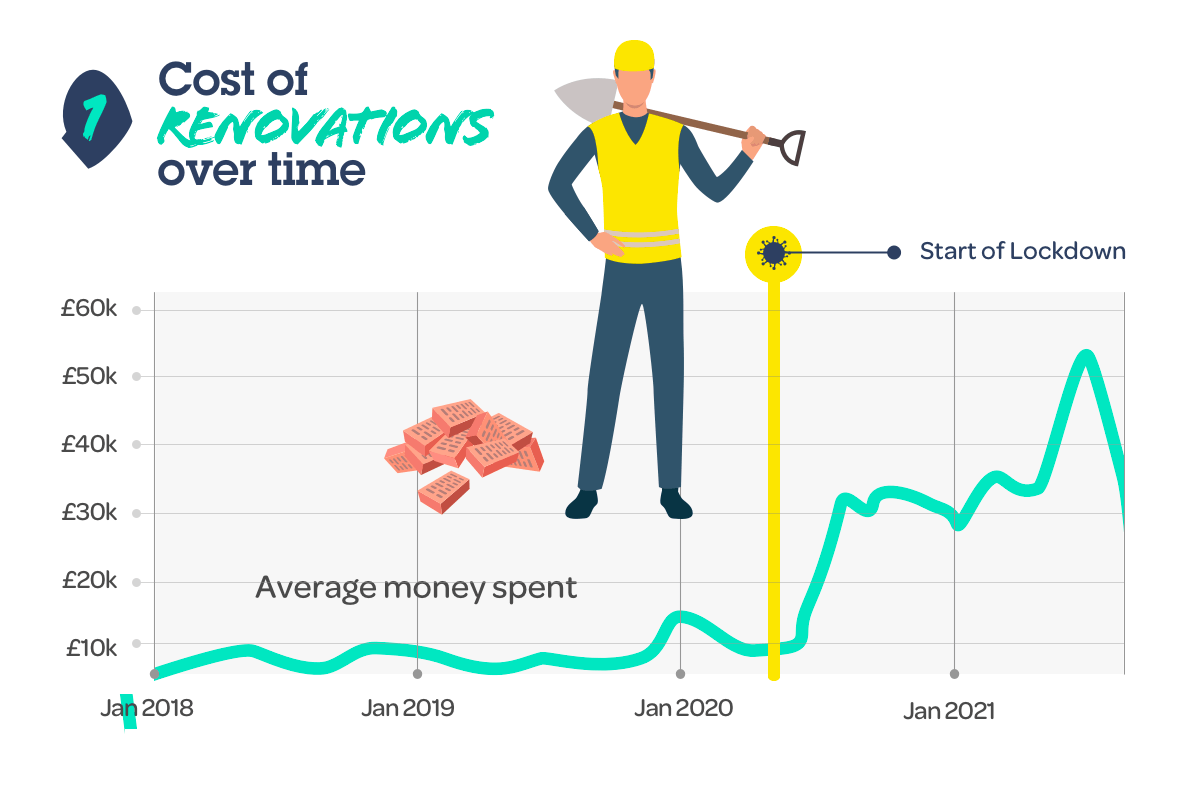
Specifically, the cost has leapt from an average of £15,148 between January 2019 to March 2020, to £41,865 in June 2021. This steep rise began in April 2020, where the cost almost doubled to £27,895. Since then, the average cost has been £40,820, peaking at an average cost of £57,706 in May 2021.
...And the costs continue to rise
Looking at the average cost across two consecutive months at a time, it becomes clear that the amount homeowners are spending on building and home improvement is actually continuing to rise. While the initial jump in cost is due to homeowners doing bigger jobs around the house, there may be other factors contributing to the ongoing rise – such as the increasing cost of materials.
Brits are embarking on bigger, lengthier projects
Project duration has also increased significantly. The average number of days for a renovation in March 2020 was 55. This vaulted to 204 in April 2020. By June 2021, this had reached 233.
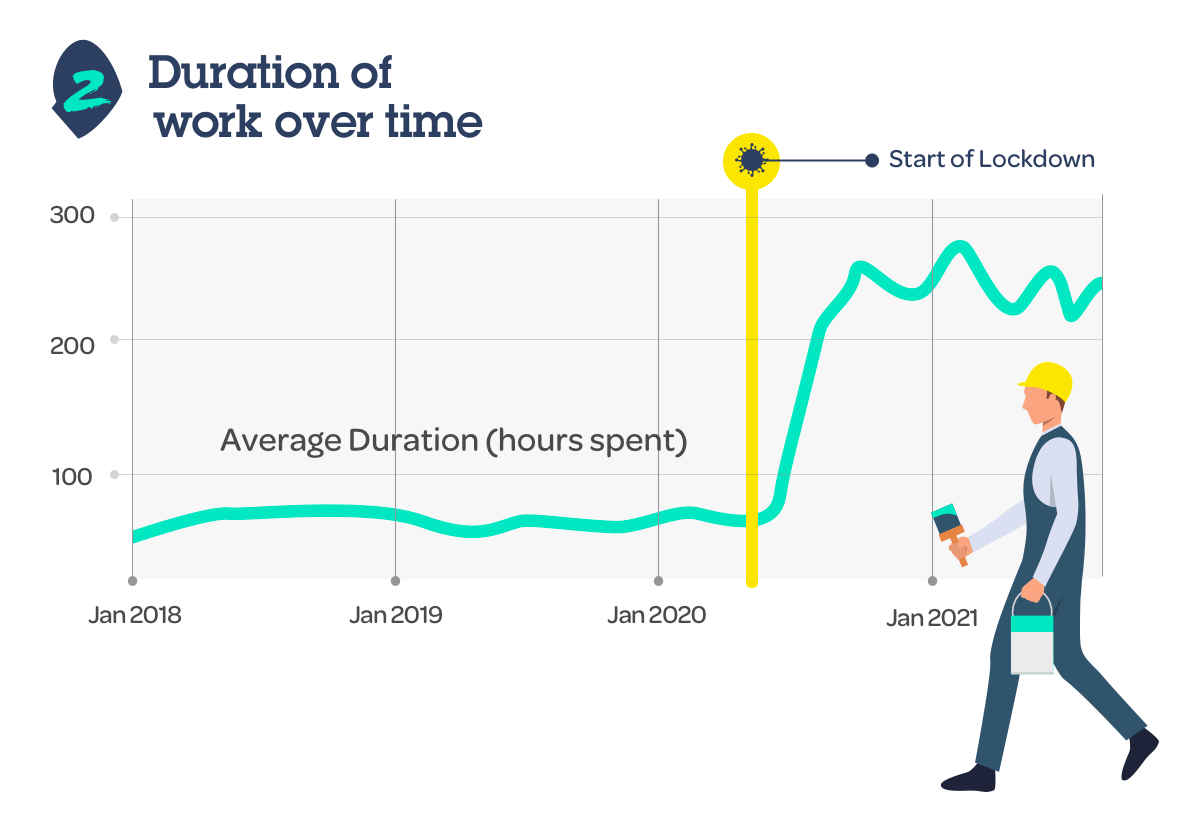
Likewise, property occupancy during projects has markedly dropped. Before the first lockdown, properties were typically occupied over 99% of the time during the renovation. In 2021, this has dropped to 69.71%.
Noel Summerfield, Head of Household at Admiral, says: “The massive increase in the average project duration shows Brits are taking on meaty home improvement work.
“The dip in occupancy suggests the work being undertaken is so disruptive that homeowners need to move out. As people seem to be having bigger jobs done – which we can see by the average cost of the work – they probably don’t want to be at home or can’t be while the work’s being done.
“The pandemic may also be another consideration for some homeowners. People might not want to be at home while the construction is ongoing and may feel more comfortable living elsewhere temporarily.”
Brits are maximising space
When home insurance customers say that they’re undergoing renovation, Admiral asks what type of work is being done. Over the last four years, homeowners have told us the following:
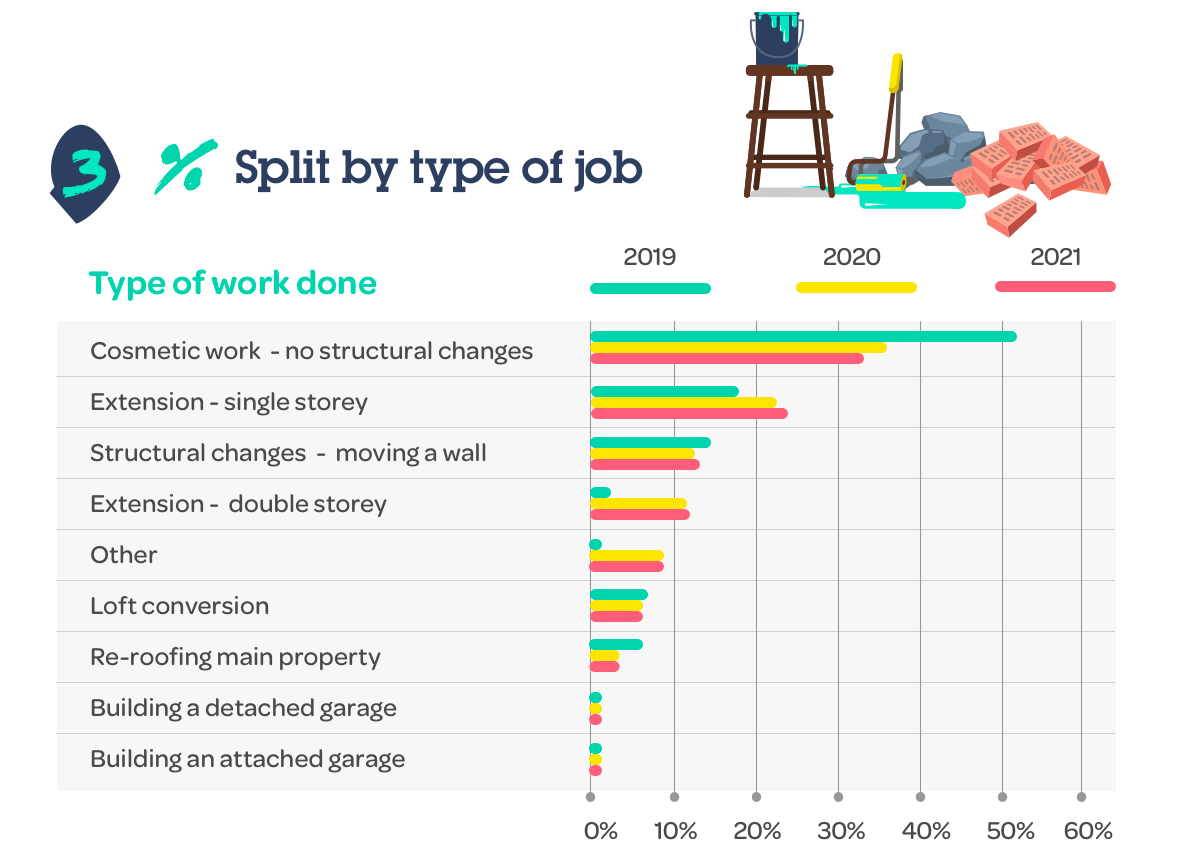
Noel Summerfield continues: “The most notable stats here are the comparative drop in cosmetic work, and rise in extensions, which suggests homeowners are doing more extensive structural work than before. This is usually driven by the desire for more usable space – something many homeowners have wanted following the national lockdowns last year.
“There’s also a big rise in ‘other’. This typically includes things like basement conversions and major rebuilds.”
Indeed, “the race for space” was quoted as being the number-one home improvement trend in 2021 by Rated People5. Its top five value-adding home improvements – including the average boost to the property value – were as follows.
Home improvements and the value they add to the property:
Self-contained annex |
£14,385 |
|---|---|
Loft conversion |
£12,951 |
Kitchen extension to create a large kitchen diner |
£11,514 |
Newly renovated kitchen |
£10,649 |
Summerhouse / garden room |
£9,188 |
...But trades have been stretched
“It's beyond at the moment. Everyone wants things done last week.” Chris Small, Imperial Construction
The massive increase in demand has understandably put a strain on the industry. The Federation of Master Builders (FMB) quarterly State of Trade Survey for Q1 20216 found that:
- More than half (55%) of those surveyed reported higher workloads than Q4 2020
- Enquiries increased at their fastest rate in more than a decade
- 93% of respondents reported material price increases
- 38% of builders are struggling to hire bricklayers – up from 22%
- 34% of builders are struggling to hire carpenters – up from 23%
TrustMark CEO Simon Ayers says: “This demand has meant that all trades have been, and still are, extremely busy. Enquiries and orders have increased, while at the same time they have been adapting to new ways of working brought about by the pandemic, and the need to keep employees and customers safe.
“World-wide shutdowns in manufacturing and production, restrictions in cross-border travel, and domestic lockdowns have all contributed to the reduction in availability and delays in the supply of building products and materials. The price of materials has also been impacted as availability fluctuates. Add these things together and the result is that projects will continue to take longer to start and be completed with the possibility of price increases before the job is finished.
“These changes present different challenges for homeowners and businesses alike. Businesses need to continue to find innovative ways of working in the face of supply issues, add flexibility into their contracts and be open and honest with their customers about the issues affecting the industry as a whole.”
And while Brexit hasn’t led to an exodus of skilled workers across the board, some areas have been hit by skills shortages harder than others. According to Graham Watts, CEO of the Construction Industry Council7, dry lining is an example of a sector which has been heavily affected. Previously reliant on eastern European migrants – many of whom have since left the UK – this area has seen labour shortages, which in turn pushes up costs for employers.
Consumer Insight
We also quizzed homeowners regarding any home improvements completed during the pandemic. We conducted the Doing Up Britain survey in July 2021 among 2,003 respondents – all of whom are homeowners in the UK.
Here are some of the key findings.
Two thirds of homeowners have been making improvements
Around two in three of those we spoke to had conducted home improvements over the previous 18 months8. The most popular home improvements among respondents were painting and decorating, and garden improvements.
Of those who tried to contact a tradesperson, two in three had problems
Around half had tried to contact a builder or tradesperson in the previous 18 months. However, around two in three said they had problems contacting their builder or tradesperson to get them to work9.
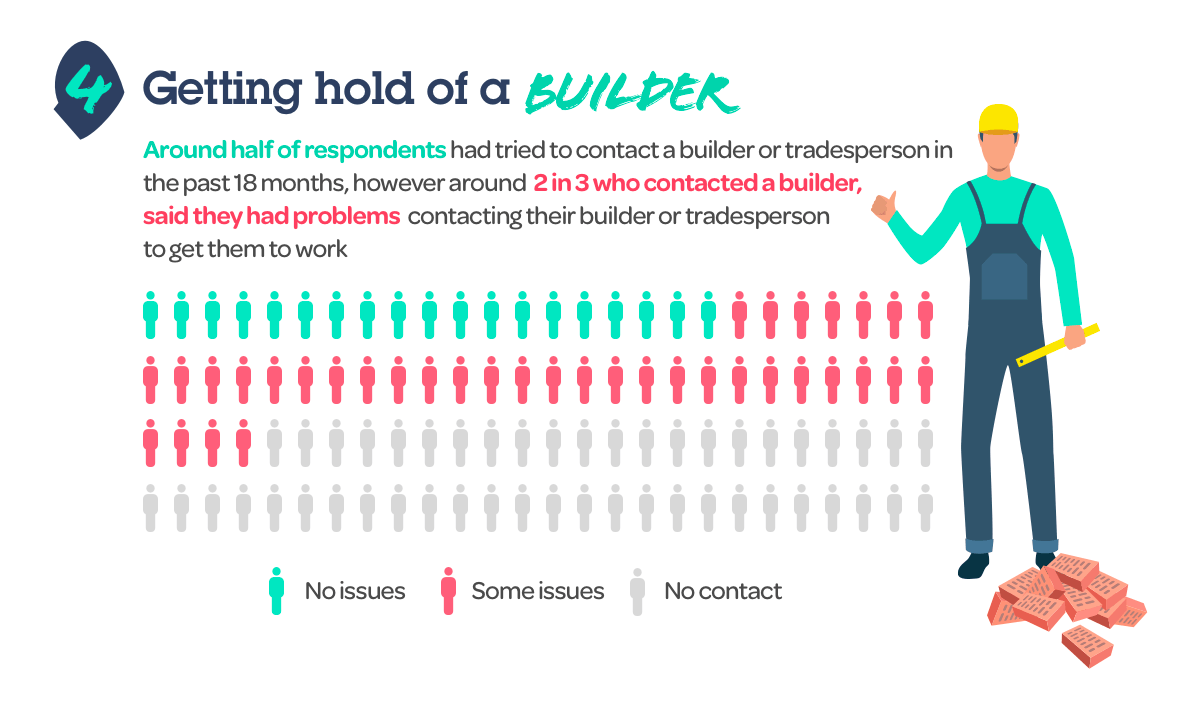

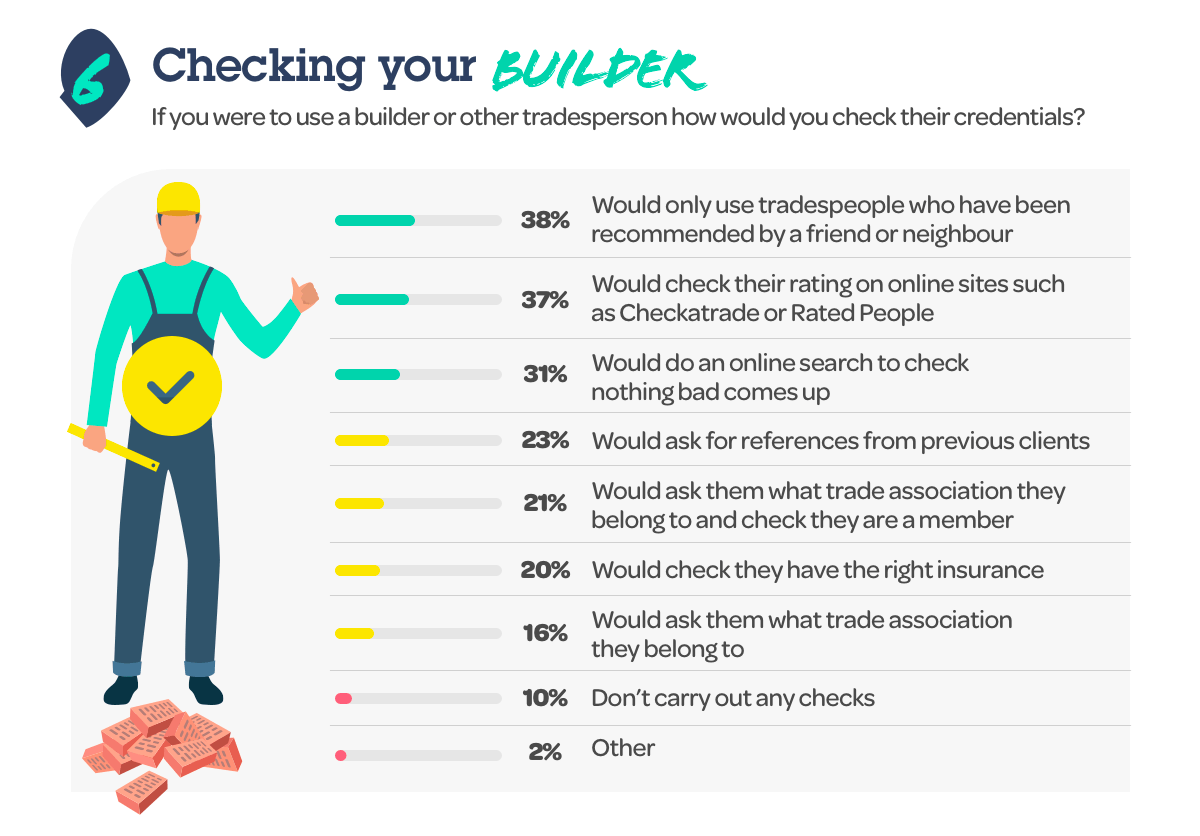
Over 44% experienced delays, or knew someone who had
Just over two in five had experienced – or knew someone who had experienced – delays with their building projects in the previous 18 months10.
Younger people are getting work done
Some 79% of the 18-34s said they had tried to contact a builder in the last 18 months. This decreased with age, falling to 49% of the 45-54s saying this, and 44% of the 65+ saying the same.
According to Noel Summerfield, Head of Household at Admiral: “Our research suggests millennials are buying fixer-uppers to get on the property ladder11. This explains why they’re more likely to be reaching out to builders to complete renovation works.”
Renovations are most popular in London and the North-East
Some 73% of Londoners said they had contacted a builder or tradesperson in the last 18 months, along with 70% of those from the North-East saying the same. These were the two regions of the UK with the greatest proportion of those looking to improve their homes.
Advice and tips
Planning a project
Planning well in advance will set you in good stead for your project. Take into consideration that most good-quality tradespeople will be booked up months in advance.
According to Chris Small and Kevin Davies of Imperial Construction, South Wales: “The first question we ask now is 'When do you want it done?' before even considering pricing it. At the moment, we can't fit anything in until February 2022.
“Most builders we know are booked in until next year. We can't complain... But the problem is fitting all the customers in, and getting hold of all the materials.”
The present state of construction is causing tradespeople to be flexible and think on their feet. But Simon Ayers, CEO of TrustMark, doesn’t believe the onus should fall wholly on the workers. “For homeowners, it’s understanding the need to plan ahead as much as possible and be flexible with dates if you can.”
Chris Small and Kevin Davies continue: “Look at the planning permission side of things, or get an architect. All you need is a basic drawing. If you’ve drawn up some simple plans, you can compare quotes from a few different builders, and they'll all be quoting the same job. If some things are missed out while getting a quote from another builder, then you're not comparing apples with apples.
“Also, have a clear budget in mind. Jobs aren't always simple, and things can add up. So it’s important to know how much you want to spend.”
“Make sure you get enough quotes, and that the tradesperson has availability when you need them... And that you're in their diary!” Susie Johnson, homeowner, Brighton
Choosing a tradesperson
When it comes to hiring the right person or team for the job, be sure to do your research – even in addition to taking word-of-mouth recommendations.
While having a new kitchen installed, Jenny from Worcester made a few unwise choices when it came to tradespeople. “Our plasterer boarded up a doorway, and then later admitted to having no business doing that job. Then he left his tools and clothes in our house for weeks, and came back to get them one day without warning.
“We also have a faulty patio door we can’t do anything about, as we used a family friend who’s now too busy to come back and look at it.
“If anybody could learn from my mistakes, I’d say don’t take recommendations on face value, from anyone you don’t trust implicitly and can ask questions of.
“We took a few recommendations, or just used people we knew who did mates’ rates on the side. But the problem then is that it’s awkward if something goes wrong... Or they’re just not that good, and you didn’t check their previous work beforehand.
“Being able to check reviews online is really helpful, and I found our amazing tiler that way.
“By contrast, we got let down last-minute by a builder in the family who took a job for more money. Having no strings attached makes it much easier to resolve issues.”
Simon Ayers, TrustMark CEO, echoes this sentiment. “Getting the right tradesperson for the job is paramount, and it’s better to wait a little longer to get the result you want.
“It’s also important to gather the relevant information about the businesses you are interested in:
- Check their credentials
- Do they belong to a trade association or quality scheme? Is their work inspected?
- Ask to see their insurances and what guarantees they offer
“All good-quality businesses, including those TrustMark Registered, will have these in place and be happy to show you.”
Doing Up Britain Survey
- The highest proportion – 44% – said that if they were to employ a builder or other tradesperson, they would generally find them via word of mouth
- 22% said via an online search
“It helps if you find a rapport – i.e. you get on with them and like their mannerisms. Sounds shallow, but it's really important I think. It keeps communication positive, and tradespeople amiable and wanting to do a good job for you.” - Susie Johnson, homeowner, Brighton
“Don't assume anything. Talk things through and ask questions, no matter how trivial they may seem. That way you’ll both have a common understanding of what’s required or any limitations.” - TrustMark
For more information, read our guide to finding a reliable tradesperson.
Sourcing materials
Certain supplies for the job will necessarily be sourced by the tradespeople you hire. But for the finished product to look just how you want it, you’ll be choosing particular materials – from an entire kitchen or bathroom, right down to a humble tile.
In cases where you’re after certain bespoke supplies, it’s a good idea to choose items and check their availability before committing to a job.
And with demand comes cost. According to GOV.UK’s Monthly Statistics of Building Materials and Components, in June 202112, the overall cost of building materials has increased by 14.7% since June 2020.
Chris and Kevin from Imperial Construction told us: “Our biggest issue at the moment is price. Timber has gone up dramatically. A lot of materials have more-or-less doubled in price. And things may possibly go up again before Christmas.
“Coronavirus may have had a part to play, with its impact on shipping and so on. But from what I understand, a lot of this has to do with Brexit. Some of the countries exporting materials won't have Britain as a priority.”
According to GOV.UK, in the 12 months leading up to June 2021, imported plywood has seen the greatest increase in cost (+66.6%); followed by fabricated structural steel (+53.3%) and concrete reinforcing bars (+51.9%).
Kevin continues: “The way things are going, you can’t accurately predict material prices – and get the prices right – for a job starting in six months. When quoting, you have to say there are likely to be variations, because of the fluctuations in the price of timber, for example.
“That’s not to say we can’t price a job for six months' time. Our labour costs will stay the same – we've got no reason to increase that. However, with materials, we've got to adjust accordingly as it goes up.”
“If materials need to be bought in advance by the business, it is reasonable that the business may ask for a deposit or percentage of these costs as the job progresses.” TrustMark
While hopefully we won’t be sprung with any more lockdowns, with delays in acquiring materials likely to continue, it’s a good idea not to set dates before you know for sure the materials will be in your possession.
In the case of the first lockdown, which was largely unforeseen, inability to get hold of supplies couldn’t be helped, as Lee Dando from Cardiff learnt.
“I was in the process of having an extension at the time of lockdown. A project which should have taken four months took eight.
“There was no issue with the contractors. They were happy to carry on working. It was that there were delays in obtaining the materials – in particular the roof rafters, as the supplier had to have a limited workforce.
“From what I understand, due to the social distance rules in operation, the supplier could only have a limited workforce at any one time, as the staff had to work in close proximity.
“They also had delays getting hold of materials. The builder was advised the orders were being provided on a first-come, first-served basis. Had the lockdown restrictions not been implemented when they were, the roof rafters would have been delivered in March. They were delivered at the end of May.
“The builders also had issues obtaining plaster, screed, roofing slates and the PVC doors. The head builder had to travel a fair distance to get a lot of the materials, with his costs increasing. And, to be fair to him, they weren’t passed onto me.”
Don’t forget to tell your insurer!
If you’re undergoing building work, make sure you let your home insurance provider know. This means you’re covering your home (and your back) in case anything goes wrong during the course of work being carried out.
Noel Summerfield, Head of Household at Admiral, says: “In simple terms, people should tell us when taking out a policy if they have any work planned or ongoing. When getting a quote, we specifically ask about any building or renovation work. We need to know what work is being done, and whether their home will be unoccupied during the project.
“When using our InstaQuote service for a quick home insurance quote, we include this assumption: that the property is ‘not currently undergoing any building work or decoration including internal changes (except routine maintenance and decoration)’. If they can’t agree to this, they need to go through a longer form where we ask the question about renovation.”
Whoever provides your home insurance, be sure to check your policy for the exact terms. But it’s a standard requirement to let your insurer know if you’re having building or renovation work done – whether that’s inside or outside the property. This tends not to include standard decoration or maintenance, such as painting a room or fixing your drains.
However, if you’re doing something more heavy-duty – such as building an extension or demolishing a wall – then you must let your insurer know. Likewise if the number of bedrooms or bathrooms in the property will change, this should be reflected in your policy document.
Noel continues: “Customers should tell us beforehand – and many do – but we do sometimes find out when a claim is made or at renewal, mid-renovation or post-renovation.”
Not declaring renovation work can put homeowners at risk of not being covered if they need to make a claim. And a surprising amount are prepared to run this risk. When we conducted our Doing Up Britain Survey, we asked when respondents would notify their insurer of renovation work being carried out on their home:
- 22% said when the work was finished, but 21% said they wouldn’t tell their insurer!
- By contrast, 43% (the highest proportion) said they would notify their insurer while the work was being undertaken. And 38% said that they would contact their home insurance company to discuss if their buildings insurance policy was affected.
Preventing things from going wrong
“Before work starts, don't forget to make the necessary access available – is there adequate parking or provision for off-loading materials? What about pets, children, neighbours and toilet facilities?” TrustMark
From a work point of view, to prevent things going wrong – or to mitigate if they do – try to keep things watertight from the outset. TrustMark advises: “Always use a written contract as it offers you protection if anything does go wrong. Make sure it includes the cost, expected timescale and how the tradespeople will deal with any disputes that may arise.”
“Providing there's no disputes, pay people on time! It keeps them keen on the job. Don't forget to give positive feedback when the job completes. If something goes wrong down the line, they'll be much more willing to sort it out and take ownership.” Susie Johnson, homeowner, Brighton
If things do go wrong
TrustMark continues: “If something does go wrong, raise it with your tradesperson as soon as possible. The contract should describe their complaints or resolution process clearly so you can see the steps to take.
“Check whether the business is a member of a trade association or quality scheme like TrustMark, as it may provide additional support and protection.
“It’s a good idea to gather any evidence – for example photographs – and make a note of dates when conversations take place, and names of people you’ve spoken to. From planning to completion, good communication is vital and can often prevent issues arising in the first instance.”
Aside from problem resolution, things going wrong can exact a mental toll. Bethan Jones from Pembrokeshire told us that there have been times when she’s lost heart.
“We’re renovating a cottage near Milford Haven. We’ve gone from ‘We’ll just decorate and move in after a few months’ to now three years in and still not finished. I became pregnant not long after starting the project, and kind of outgrew it before even moving in.
“To put it into context, the house is tiny. It shouldn’t be a Grand Designs-style three-year project. We just went down a rabbit hole.
“As we don’t live in the property and are renting elsewhere, anything going over budget and over time causes a lot of stress – because just owning the property costs a lot. It can lead to arguments and anxiety. The process can be exhausting, and consuming.”
But she stresses the importance of keeping the end goal in mind.
“We keep reminding ourselves: ‘It will be really nice when it’s done’. And we’re hoping to be in by Christmas! I’m just looking forward to sitting outside with a gin and tonic, and watching the boats come in and out.”